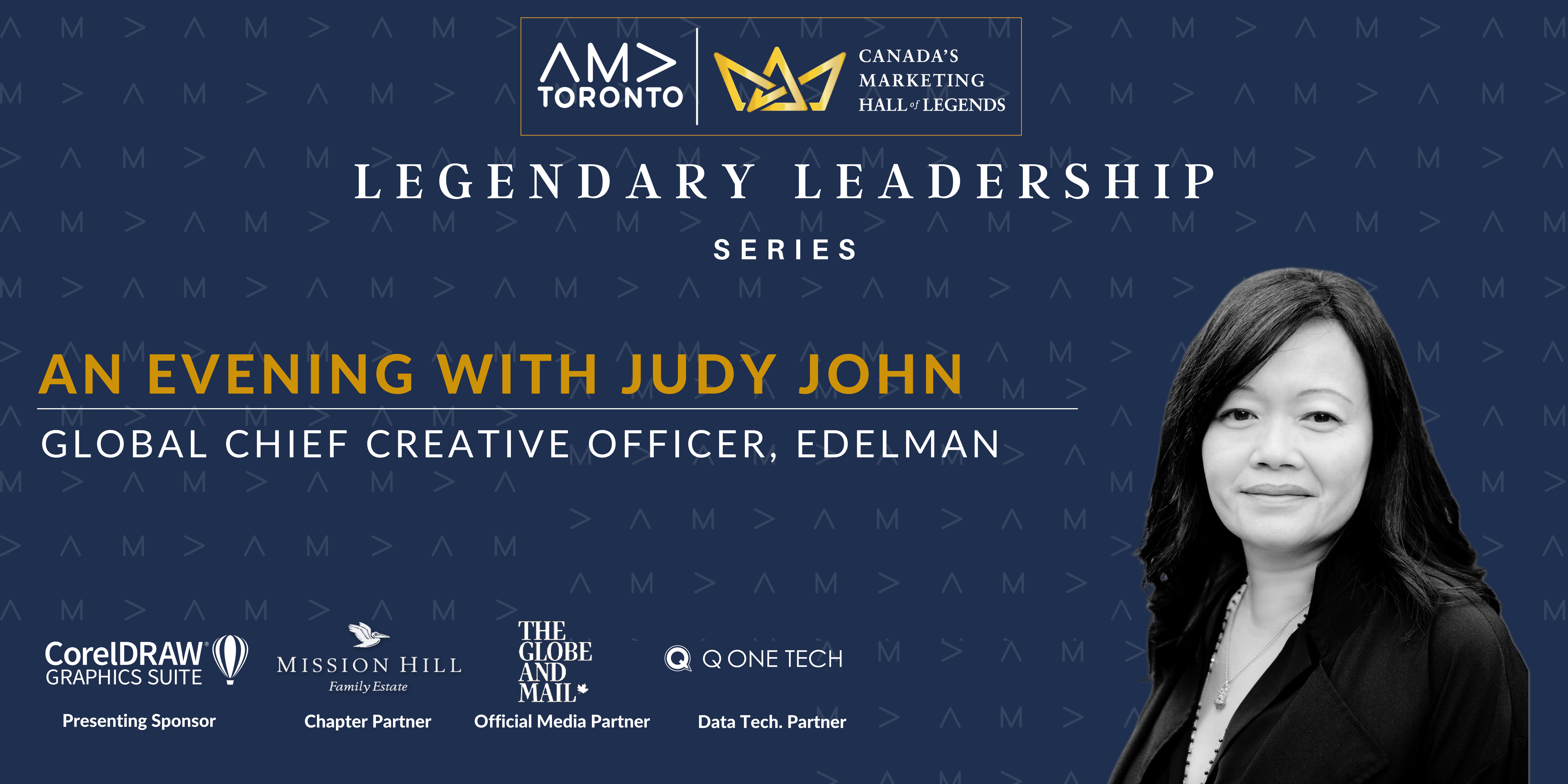 AMA-Toronto’s first in a new series of quarterly events, Legendary Leadership, was held April 9th at Revival Bar in Toronto’s west end. Aimed at giving the community direct access to members of the Marketing Hall of Legends, this new event series gives insights into a legend’s success, and how their ideas and contributions to marketing and brand building have made an impact in the marketplace.
AMA-Toronto’s first in a new series of quarterly events, Legendary Leadership, was held April 9th at Revival Bar in Toronto’s west end. Aimed at giving the community direct access to members of the Marketing Hall of Legends, this new event series gives insights into a legend’s success, and how their ideas and contributions to marketing and brand building have made an impact in the marketplace.
The inaugural ‘fireside chat’ was with Marketing Hall of Legends inductee Arthur Fleischmann (President and CEO of john st.,.jpg) an agency who has done significant work for big consumer brands), in conversation with Leslie Root (Senior Vice President of Marketing, TJX Canada. TJX is the company behind Winners, Homesense and Marshalls.)
an agency who has done significant work for big consumer brands), in conversation with Leslie Root (Senior Vice President of Marketing, TJX Canada. TJX is the company behind Winners, Homesense and Marshalls.)
The wide-ranging conversation centred around identifying what trends are actual trends, and what are just fads that could hurt your business.https://www.youtube.com/embed/oO7-b4yopbU
“Everything has changed!”
Fleischmann’s first key point of the evening was that in his 30+ years in advertising everything has changed, including the birth of the Internet. This started a discussion about the impact of cultural change on advertising and marketing. Fleischmann’s agency, john st., was literally doing their first pitch when the 9/11 attacks happened. He cited the domino effect that event had on the culture broadly, and how it created a dramatic shift in marketing and technology. He pointed out how you can trace massive changes like the #MeToo movement and the Arab Spring to cultural and technological transformations that stem from the paradigm shift that was 9/11.
Root agreed that cultural change has been dramatic in recent decades, citing especially the move toward ensuring agencies reflect contemporary Canadian diversity in advertising. One example she used was an emphasis today on whether clothing stores have enough plus sizes. It used to be that plus-sized consumers were marketed to differently. “But why?” Root asked. “We all buy the same.”
Both speakers highlighted the need for agencies to keep an eye on cultural shifts as a way for them to stay alive and vibrant in today’s marketplace. “That’s where the really exciting stuff is,” said Fleischmann.
Purpose and Order
As discussion turned to how agencies can stay relevant, Root suggested thinking about inventing the business that will put you out of business, and using that as a guide to how to constantly reinvent.
Fleischmann agreed, saying that he and his partners had kept her quote in mind for years. He said you don’t want to change the DNA of your business, but consider service aspects, channels, expertise, resources, talent in the room that you need, to continuously reinvent your business.
This has helped keep him focused on two key ideas for brands: purpose (why do you exist, beyond the functional?) and order (what are the design systems and design thinking that make you relevant across multiple platforms?) Keeping those two ideas in mind as they work with clients has been a hallmark of john st.’s success.
Winning People
One trend that Fleischmann does see as legitimate is what he called “demographic fluidity.” Especially when it comes to age, the most successful products, brands, and services are being marketed today to 20-somethings the same way they are being to 60-somethings. People across this age range will shop at some of the same stores, eat at the same restaurants, plan the same trips, drive the same cars.
Given the differences across this age range, what can we use to target instead of demographics? Fleischmann suspects that to unify targets that are so fluid means values-based marketing will become increasingly important, and that the shift will be to “winning people” instead of winning a target demographic.
Everything is Performance
The speakers also engaged in a little myth busting as discussion turned to the ‘decline of retail’ and the ‘death of advertising.’
Root acknowledged that retail has faced challenges in the era of online shopping. But, she pointed out, there are lots of good news stories, including of retailers who are expanding. She emphasized that evolution of the in-store experience is what’s key. That means changes like smaller footprints and more showrooming. “You want it to be a rich experience”, she said, “but without sacrificing what loyal customers love about the brand.”
Likewise, Fleischmann was skeptical that agencies or advertising are going anywhere.
Advertising and marketing have supposedly been “on the chopping block” forever, he pointed out. But, he argued, even with all the advanced tools we have access to today you can’t build a brand solely on data, or hyper-targeting, or getting really granular. Pure data can never take over for creating a distinctiveness of brand that has always been (and continues to be) so important.
“All marketing is performance marketing,” said Fleischmann. “If you’re doing anything that isn’t driving preference, and sales, and differentiation, you shouldn’t be doing it.”
Fleischmann pointed out that brands are only going to become more important in the era of online shopping and voice search. If you want a specific product from an online retailer you need to search by that brand name, or else you will be presented with a sponsored product or a house brand.
Advertising and marketing isn’t dying, but it will change and morph over time in response to consumer and market demands. But so long as advertisers and agencies stay current with the technology, with their approaches, and are committed to telling interesting stories about brands they will continue to serve a need and do well.
Join AMA-Toronto’s next event, Influence Consumers with Experiential Marketing, on May 8th at the Centre for Social Innovation. Hear from leading agencies and experts about the role and true impact experiential marketing can have. For more details visit the AMA-Toronto Events page.
This article was brought to you through the partnership between the AMA-Toronto and HeadStart Copywriting.




